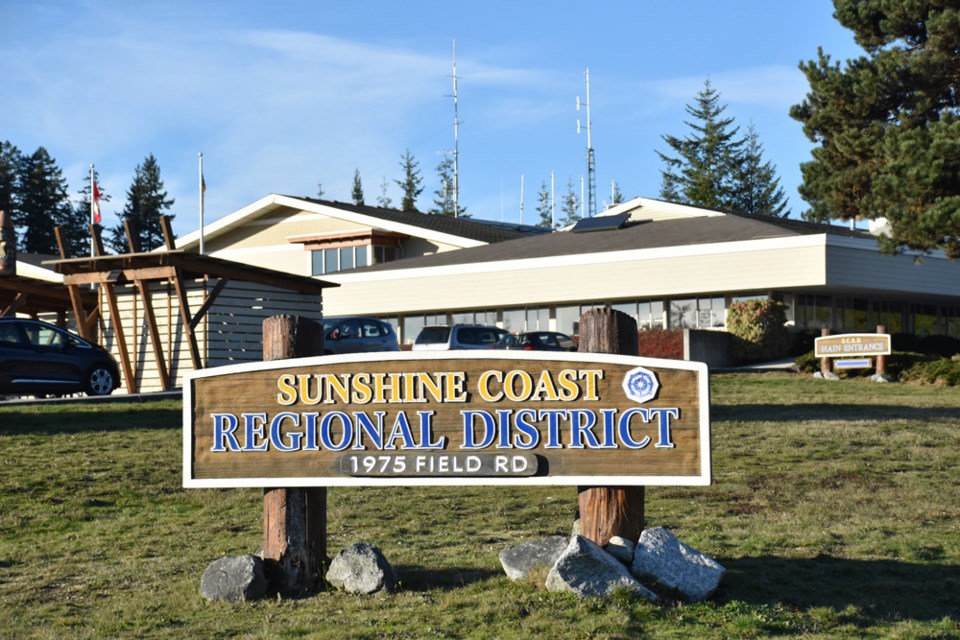People aren’t paying for gym memberships or hall rentals, more trash is being dumped at landfills and bus fares aren’t being collected.
Drops in revenue across services provided by the Sunshine Coast Regional District (SCRD) is translating to deficits. Because of that and because of amendments made to the 2020 budget to reduce taxation because of the pandemic, staff are flagging that taxes could increase by 8.8 per cent next year.
They estimate overall taxation could be 6.03 per cent higher than 2020 levels, and as of April 30, an additional 2.5 per cent would be needed to cover off the current deficits caused by the pandemic.
About $211,000 represents a one per cent increase in taxation. The increase doesn’t take into account user rates and parcel taxes to cover water, waste water and refuse collection.
“Right now we’re looking at an 8.8 increase for next year,” said Leonard Lee, director for Area A, during a May 28 corporate and administrative services committee meeting. “Thems the facts that we know. And the message has also got to be that it’s going to get worse unless we get government assistance.”
A preliminary variance report was provided at the meeting since the budget had been amended due to COVID-19. The report includes data from up to April 30.
According to the May 28 staff report, “revenues for operations in most functions are within the anticipated range for this time period,” and a majority of functions are in a “slight” surplus position. The overall surplus as of April 30 is $387,187.
However, COVID-19 has caused shortfalls to budgets dependent on fees, including transit, solid waste, building inspection, recreation and parks.
The largest deficit so far comes from recreation. That function has a deficit of $207,198 and the deficit is expected to continue to grow “and will result in a significant deficit at year end if further mitigating measures are not taken,” according to the report. A year-end shortfall of between $449,876 and $816,995 is expected.
The facilities have been closed since March 18 and user fees and charges haven’t been collected, while wages and benefits, overhead costs, contracted services and an increase in bank charges for refunds have led to losses. User fee revenue accounts for about 30 per cent, or $1.7 million of operating revenue, with the rest coming from taxation.
The Sunshine Coast Emergency Planning function has a deficit of $162,798 because of the Emergency Operating Centre running up to April 30. The deficit is expected to continue growing “slightly.” Of that, $73,800 in staff overtime is expected to be covered by the province, but the province has denied funding for costs to keep public washrooms and showers at the rec facilities open, transit service for health-care workers and community ambassadors.
Regional Solid Waste has the third largest deficit at $83,029 because of more people using the landfill and Pender Harbour transfer station. More tipping fees brought in higher revenues than normal – about three per cent more than last year – but the increased activity also brought with it more expenses and costs related to safety measures.
So far the deficit for the transit system is $25,907 because fares haven’t been charged since mid-March, and because of extra money spent on wages, benefits and cleaning and an increase in repairs and maintenance. Transit also saw an 80 per cent drop in ridership. Fare collection was slated to restart June 1. At this point, staff don’t know whether BC Transit will compensate for the losses.
Another wrench in the transit situation is the lack of synchronization with BC Ferries. Directors voted to maintain the current schedule until the end of August. Additional buses may be added if routes become busier in the summer.
Building inspections saw a deficit of $45,502, because of fewer permits, but the staff report says there are enough reserves saved to cover any shortfalls. Permit fee revenue is down 13 per cent, or about $32,180 from the same time period in 2019.
A shortfall for the Community Parks function is also anticipated, with fee revenue down $10,764, and is projected to be about $60,000 if no revenues are collected from hall rentals and Katherine Lake Campground.
Staffing positions were also affected by the pandemic. Eleven staff were temporarily laid off in the first half of May, while the use of casual employees has been “cancelled or severely limited” since March 18.
The report says that “recovery is anticipated to be slow and projections estimate that signs of ‘normalcy’ may not be realized until 2021.”
At the meeting, staff looked to directors for direction on how to offset the losses.
Chair Lori Pratt said going forward, “if we need to look at service reductions, if we need to look at staffing levels, I’m OK with that .We have services that we have to provide to the community, and we’ve got some pretty big projects coming forward, so if there’s any place we can cut to lessen the tax burden in other areas, then I think we need to look at it.
“We need to look at everything… Let’s use this opportunity to take a look and not leave a stone unturned.”
Directors looked at costs and options for “mothballing” or delaying the opening of certain recreation facilities, and a report is expected in July on that issue. Directors also voted to revisit options for building inspections in July. Cost-saving options for solid waste are also expected to come forward in July, including landfill station service hours and demands.
Staff recommended putting a clear communication plan in place.



